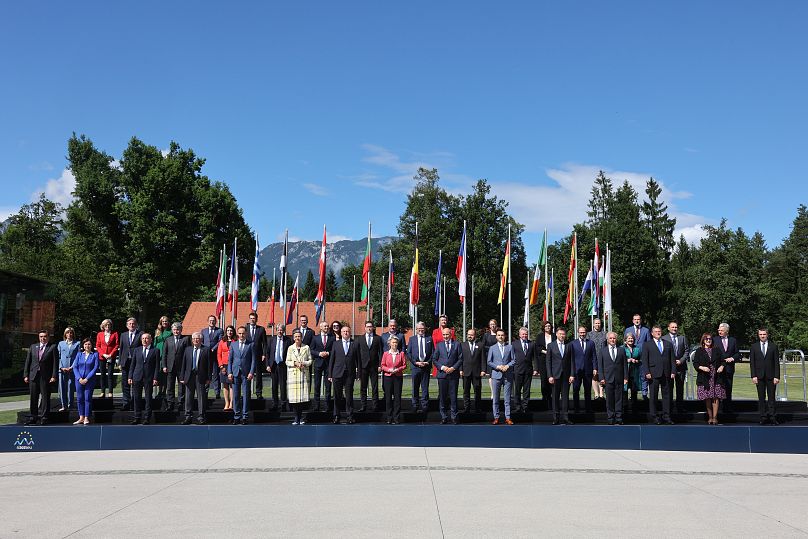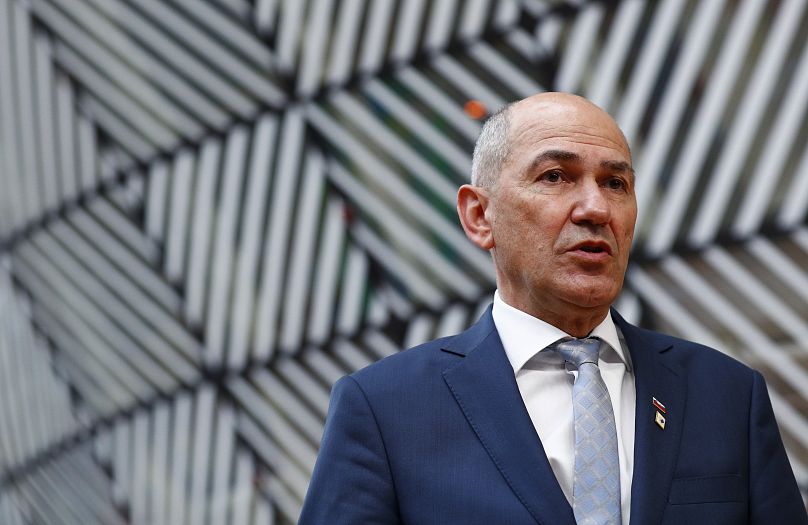Slovenia has kicked off its six-month EU Council presidency, with Prime Minister Janez Janša already under fire for attacking judges and name-shaming journalists.
Slovenia's EU Council presidency is off to a rough start, with Prime Minister Janez Janša already under fire for attacking judges and name-shaming journalists.
 ADVERTISEMENT
ADVERTISEMENT
 ADVERTISEMENT
ADVERTISEMENT
Every six months, an EU member state takes over the presidency of the Council of the European Union, an institution that, together with the European Parliament, amends and approves legislation.
The presidency's main responsibility is to organise the Council's working programme and liaise with the Parliament and the European Commission in order to pass EU laws.
On July 1, Slovenia took the reins of the EU's rotating presidency from Portugal, marking the second time the central European country with two million inhabitants has occupied the position.
In addition to a heavy workload and intense policy-making, the EU Council presidency comes with a renewed attention over the appointed country and its head of government.
In this case, the attention has quickly backfired.
'An unacceptable attack'
During Thursday's event to celebrate the presidency's kick-off, the whole College of European Commissionaires, headed by Ursula von der Leyen, descended upon Ljubljana to meet their counterparts and discuss policy priorities.
But Janez Janša surprised attendants with a selection of pictures that allegedly portrayed Slovenian judges interacting with lawmakers from the S&D party, the socialist group of the European Parliament. The Prime Minister denounced the magistrates as biased and partisan, Euronews understands.
Janša, like von der Leyen and German Chancellor Angela Merkel, belongs to the centre-right European People's Party (EPP), although many say he espouses a harder line to conservatism.
Frans Timmermans, who is the EU Commission's vice-president in charge of the EU Green Deal and one of the most prominent socialists in Brussels, took exception to the suggestion and consequently refused to join a group photo between the Commissioners and the Slovenian cabinet.
"I simply could not be on the same podium with prime minister Janša after his unacceptable attack on and defamation of two judges and two S&D MEPs," Timmermans said in a statement.
"He challenged their integrity because they were in the same picture. Judicial independence and respect for the role of elected MEP’s are cornerstones of the rule of law, without which the EU cannot function. We can never stop calling out those who attack it."
His comments were echoed by his boss, Ursula von der Leyen, who stood next to Janez Janša during a joint press conference where she officially unveiled the Commission's green-light for Slovenia's €2.5 billion national recovery and resilience plan.
"As we collectively prepare and finance our recovery, trust is our most valuable asset. Trust in solid institutions. Trust in an independent and efficient judicial system. Trust in free, and independent, and properly funded media. Trust that freedom of expression, diversity and equality are always respected, and that the rule of law and European values are always upheld," von der Leyen said.
"And to be very clear: Political dialogue requires respect for all democratic political parties."
President von der Leyen also criticised the Slovenian government for failing to nominate a delegate prosecutor to the European Public Prosecutor’s Office (EPPO), a new body charged with tackling fraud, corruption, and money laundering involving the EU budget. While not every member state is part of the entity, all those who signed up to the scheme are compelled to put forward delegate prosecutors to carry out investigations on the ground.
"Pact sunt servanda," von der Leyen quipped, referring to a universal principle of law that dictates that signed agreements must be kept.
Left-wing vs right-wing
The following day, Janša showed journalists, many of whom were Brussels-based correspondents who were in Ljubljana covering the presidency's launch, a 16 minute-long video that depicted instances of misbehaviour and malpractice allegedly conducted by left-wing journalists against their right-wing peers.
According to Janša, the video demonstrated the double standards of today's mainstream media, which, in his view, tend to favour progressive voices to the detriment of conservative ideas. The Prime Minister took the opportunity to lambaste "activist" journalists who quit their jobs to enter politics.
The controversy was further compounded when, that same day, the Slovenian Interior Minister Aleš Hojs made a comment that appeared to refer to an EU high official as "swine", a crude characterisation that many media outlets interpreted as an insult against Frans Timmermans.
Although Hojs later denied he was speaking about the Commission's vice-president, Slovenian President Borut Pahor was forced to intervene and publicly castigate the Interior Minister, urging him to be "extra careful" when speaking on behalf of the government.
"We don’t need to agree, he does not need to present a position that is necessarily acceptable for all, but it must be uttered respectfully," President Pahor said.
On Monday afternoon, a spokesperson from the Commission clarified the statement had not been directed against any member from the executive.
"We would simply wish to let the matter rest here," the spokesperson said.
But on Tuesday morning, during a plenary session of the European Parliament attended by the Slovenian Prime Minister, the socialist, green and liberal groups denounced Janša's behaviour and asked him to respect political diversity and media pluralism, two core values of the European Union.
"Let me tell you it's not a good sign what happened last week" during the presidency's inauguration, said Iratxe García Pérez, leader of the S&D group. "Respect is a key value in our daily tasks."
"Please stop harassing journalists and judges," said liberal MEP Malik Azmani, who accused Janša of "petty politics" and wished other EU Commissioners had joined Timmermans in his walkout.
Janša defended himself by arguing that having different and competing values is part of people's nature.
"When we talk about the future of Europe, we need to hear everybody," he calmly replied, adding that the lawmakers' points of view, like his own, were all "legitimate".
Press freedom concerns
The combative atmosphere of the Slovenian presidency's inauguration has brought back under the spotlight long-standing concerns over the press freedom in the country.
Slovenia is currently ranked 36th on the World Press Freedom Index of Reporters Without Borders, higher than Italy and the United States, but lower than most Western nations. The country has seen its ranking position fall in recent years.
"Defamation is still criminalised and well-known politicians continue to subject media outlets to intimidatory lawsuits and often slanderous verbal attacks. These tendencies became even more accentuated when Janez Janša, the leader of the far-right SDS party, became prime minister in March 2020," says the country's page on the Reporters Without Borders website.
Janša has publicly expressed dissatisfaction with the work of both the Slovenian Press Agency (STA) and the country's public broadcaster RTV Slovenia. Earlier this year, his government attracted international criticism, including from Brussels, when it decided to suspend the funding of STA, which the Prime Minister had previously called a "national disgrace".
The case around STA quickly became a symbol of the country's perceived democratic backsliding and Janša's critics capitalised on the controversy to censure his overall administration.
The outrage led to a European Parliament debate on media freedom that went awry after Janša tried to screen the 16 minute-long video to MEPs. When Sophie in ‘t Veld, a Dutch MEP who was moderating the panel, objected to showing the reel, the Prime Minister abruptly switched off his video connection and abandoned the debate.
While funding for STA has since then restarted, the government continues reprimanding the agency, arguing it is withholding documentation that hinders the allocation of the funds, which, according to the government, amount to €165,000 a month.
"For the time being ad hoc funds to STA are being paid without the Government having access to documentation which would allow it to assess how much the agency really needs," a spokesperson from the Slovenian government told Euronews in a statement.
"This is a legal dilemma that will have to be resolved in a legal way. It has nothing to do with politics, even though the opposition, as well as the Director of STA, have turned it into a political issue. Factually it is not."
But STA disputes these claims and says the agency lacks "proper funding" since beginning of the year, a "precarious situation" that has led to 10% of personnel leaving the company.
"We stay to fight for our right to be autonomous; to be independent, we don’t know from month to month if we are going to be able to work or not," Mihael Šuštaršič, a journalist working at STA, told Euronews in an interview.
For Šuštaršič, the real problem is the hostile environment created by Janša's government.
"Janša is bullying people around on Twitter, with all his abusive tweets he tries to silence us, not to have courage to speak about the truth," the journalist says, admitting that many of his colleagues are fearful to ask certain questions to the government that might expose them to further retaliation.
"We are concerned because we are professionals and we're doing our job by the book, at least I think so," Šuštaršič says. "You never know what you're going to get, but sometimes when you get an abusive answer, you think: 'is it worth it to stand up and do this?'"
Robert Mohoric, an assistant director at a Slovenian student radio, believes Janša is taking a page from another EU leader also known for having a fraught relationship with media: Hungary's Viktor Orbán.
"I think they are fast forwarding in the media landscape the Orbanisation of Slovenia so that they won’t be supporting any media that is criticising the government work in whatever manner," Mohoric tells Euronews.
While Janša and Orbán no longer share the same EU political family – Orbán's Fidesz party quit the EPP in March over disagreement regarding the rule of law – both remain close allies and meet regularly to deepen Slovenian-Hungarian relations.
Janša's personal affiliation will be tested during Slovenia's EU Council presidency: Hungary is on the verge of an infringement procedure after passing a new law that bans the portrayal of homosexuality and sex reassignment in school education material and TV programmes addressed to people under 18 years of age.
The law, which has not yet entered into force, appears to have touched a nerve among EU leaders and has had the effect of putting human rights and rule of law on the very top of the EU's agenda, the same agenda which the Slovenian government, as holder of the rotating presidency, is expected to steer through.
Every weekday, Uncovering Europe brings you a European story that goes beyond the headlines. Download the Euronews app to get a daily alert for this and other breaking news notifications. It's available on Apple and Android devices.












